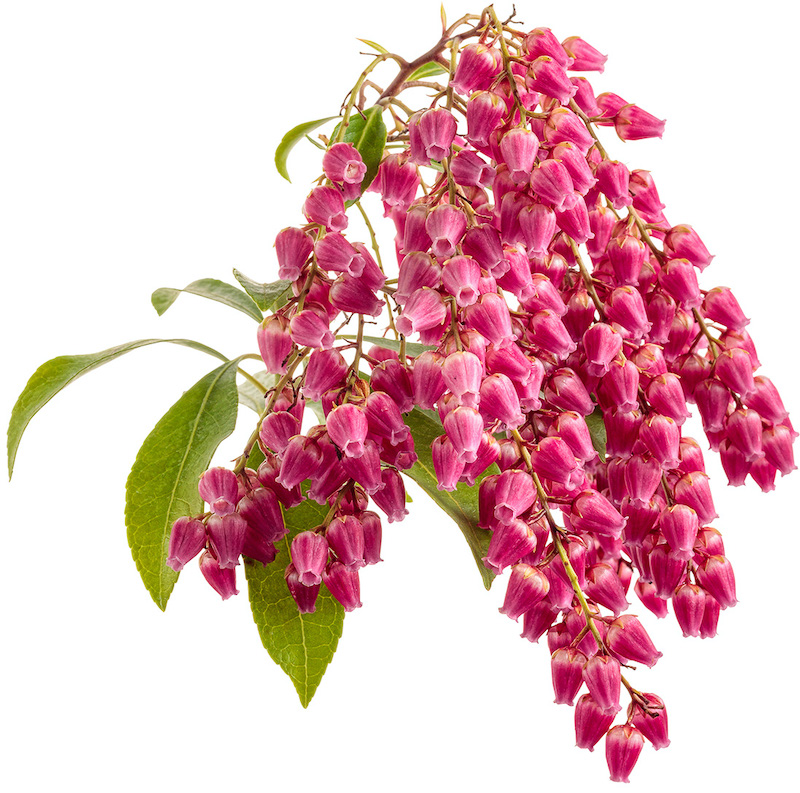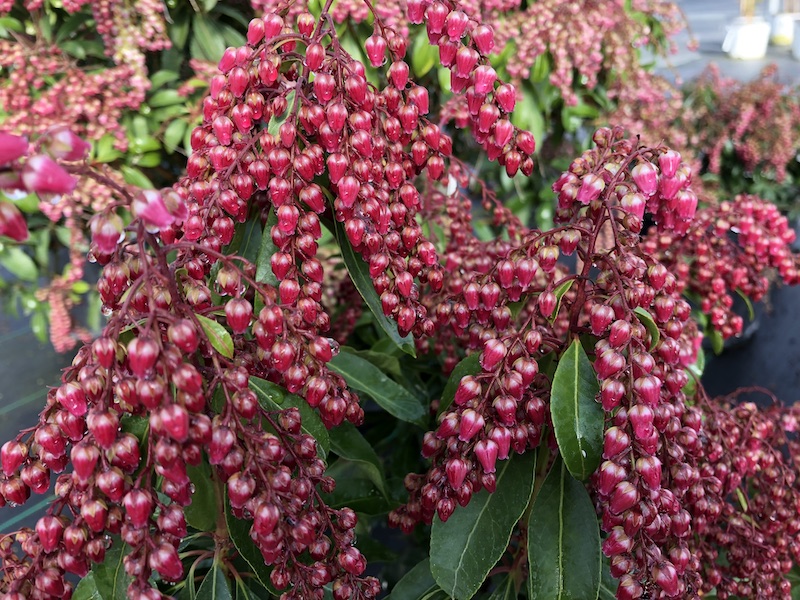Pieris japonica, also known as Andromeda Shrub or Lily of the Valley Shrub, is an amazingly low-maintenance, evergreen shrub that provides beautiful flowers early in the spring and colorful foliage year-round. Unfortunately, these shrubs are poisonous to humans and pets. All parts of Pieris japonica contain Grayanotoxins that affect the heart, brain, and nervous system. Even honey that is made from the nectar of plants in the family Ericaceae such as Pieris, Rhododendron, and Mountain Laurel is referred to as “Mad Honey” and is toxic if eaten in large amounts.

Are Pieris Poisonous to Children?
According to California Poison Control, Pieris japonica is a category 4 poisonous plant. This means that any ingestion of this plant will induce severe and extremely toxic effects. Children will show symptoms of Pieris poisoning quickly after ingesting even small amounts. Their low body weight means that it takes less of the Grayanotoxin to affect their bodies. Touching the plant is not usually cause for concern unless the child shows signs of irritation or a rash.
Children should be kept away from Pieris and its flowers. If you suspect that a child has ingested any part of Pieris, contact your local poison control line immediately. Do not induce vomiting until you have received advice from the helpline or your doctor. If possible, bring a sample of the plant you suspect was eaten to the doctor so that the plant can be correctly identified. The quicker you can get treatment, the better the result for the patient.

Are Pieris Poisonous to Dogs?
Dogs will have much the same reaction to Pieris poisoning as a child. Smaller breeds and puppies will have stronger reactions to ingested plant material. The most common symptoms include drooling or foaming at the mouth, lethargy, weakness, inability to eat or drink, and unbalanced, slowed, and/ or erratic heartbeat. If your dog displays any of these symptoms, immediately call your vet for further information. Make sure to bring a part of the plant that was eaten or chewed for proper identification.
Are Pieris Poisonous to Cats?
Cats that ingest Pieris can react similarly to dogs, although the symptoms of poisoning may be more subtle in cats. Cats may seem more distracted, aloof, or much less energetic. Coordination may be worse than normal. Drooling and foaming at the mouth are also common signs that warrant a call to your veterinarian. A sample of the plant should be collected for proper identification and treatment.
Are Pieris Poisonous to Other Animals?
Other animals, domesticated livestock, and other pets are equally at risk for Pieris poisoning. Horses, Sheep, Goats, and Pigs that eat Pieris as part of their grazing and rutting will have the same symptoms as smaller pets: lethargy, weakness, inability to eat or drink, and slow and/or erratic heartbeat. Your veterinarian should be contacted as quickly as possible so that a course of treatment can be started immediately.
Symptoms Of Pieris Poisoning
Always check with your doctor or veterinarian immediately for guidance if you suspect Pieris poisoning. Calling your local poison control center is a good first step in dealing with any suspected poisoning.
Here are some common symptoms to look out for:
- Excessive salivation
- Vomiting
- Abdominal pain
- Weakness
- Slow pulse
- Erratic heartbeat
- Increased respiratory rate
- Mummification of the fetus in livestock
- Seizures
- Convulsions
- Coma
Preventing Pieris Poisoning
The best way to prevent poisoning from Pieris is to not grow the plant while small children and animals have access to your garden. You can also fence off areas where pets and children can play safely and not be exposed to the plants. Teach children that no part of a plant should be put in their mouths or used for make-believe play.
Be extra careful with pruned branches, deadheaded flowers, and other plant debris. Place them out of the way of children and animals until the material can be put in a composting area, green waste bin, or trash. Clear all fallen leaves and flower petals as quickly as possible to keep neighborhood cats from eating or chewing on the plant parts.
Pet Poison Helpline
If something were to happen to your furry friend, and you suspect that they are suffering from Pieris poisoning, there is a poison control hotline to call for 24/7 vet advice. It is called the Pet Poison Hotline, and its phone number is (855) 764-7661.
Sources: "Japanese Pieris." Colorado State University Guide to Poisonous Plants. poisonousplants.cvmbs.colostate.edu
 |
Author Robbin Small - Published 8-11-2022 |
